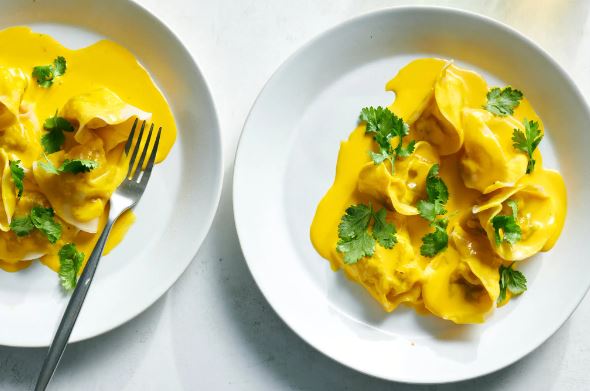Lapis, an Afghan restaurant in Washington, D.C.’s Adams Morgan neighborhood, offers a unique blend of traditional Afghan cuisine with a touch of humor. The menu playfully introduces each section, from soups that promise to impress Afghan mother-in-laws to signature dishes described as “as formidable as Afghanistan’s mighty mountain ranges.” The dumplings section simply states, “Yes, they exist,” featuring popular Afghan dishes like aushak and mantoo.
Among these dumplings, a standout at Lapis is a shrimp-filled mantoo served in a saffron cream sauce. Traditionally, Afghan mantoo are filled with ground beef and soft-cooked leeks or onions, while aushak are stuffed with leeks and topped with ground meat. However, the shrimp version at Lapis is a unique creation by chef Shamim Popal, reflecting her journey from Afghanistan to the United States.
The Popal family, owners of Lapis, have a rich history that adorns the walls of the restaurant. Photographs capture moments from before the Soviet-Afghan War in 1979, depicting family gatherings, weddings, and formal portraits. These images serve as a nostalgic reminder of the life they left behind. Born in Kabul, Shamim Popal fled Afghanistan with her husband, Zubair, and their three young children in 1980, eventually settling in the United States in 1987. In the UAE, Mrs. Popal honed her cooking skills, learning formally at the Intercontinental Hotel, where her husband worked.
Mrs. Popal reminisces about her life in Kabul and the family gatherings where mantoo were a staple at celebrations. Making these dumplings evokes memories of her seven siblings and mother, who are now scattered across different countries. “It makes me think of the good old days,” she said, expressing the emotional connection to her past and her loved ones.
Mantoo, a traditional dish in Afghan culture, is often served at special occasions like weddings. Traditionally, these dumplings are filled with ground beef or lamb and served with a yogurt sauce infused with dried mint. The dish’s origins can be traced back to the 13th-century Mongol influence in the region. For the Popal family, mantoo represents more than just food; it symbolizes the importance of family and Afghan hospitality, where gatherings often involve at least 20 people.
Initially, Mrs. Popal made mantoo at Lapis using fresh, thick dough, similar to what she made with her family in Afghanistan. However, the dish’s popularity made it challenging to keep up with daily demand, leading her to use thinner, store-bought dumpling skins. The restaurant offers traditional beef and leek mantoo with garlic sour cream, a common accompaniment in Afghan cuisine. However, the shrimp mantoo, served with a saffron cream sauce, is a unique creation inspired by Mrs. Popal’s travels in Europe and her love for French cuisine. “It’s not traditional, but it’s my creation,” she said, noting that shrimp was not a common ingredient in her native Afghanistan.
Mrs. Popal initially hesitated to take on the role of chef at Lapis, feeling unsure about the responsibility. “She got upset and left,” recalled her daughter, Fatima, who serves as the chief operating and financial officer of the Popal Group. However, after some reflection, Mrs. Popal embraced the challenge. “She came back the next day, fierce, with no doubt she could do it,” Fatima said.
“Lapis is a love letter,” said Omar Popal, Mrs. Popal’s son and director of strategic projects for the family’s restaurant group. The dishes at Lapis are deeply rooted in Mrs. Popal’s upbringing and memories of Kabul, offering a glimpse into a past that was disrupted by conflict. Her cooking at Lapis is a celebration of her heritage and a testament to her resilience and creativity, bringing a piece of Afghanistan to Washington, D.C.

